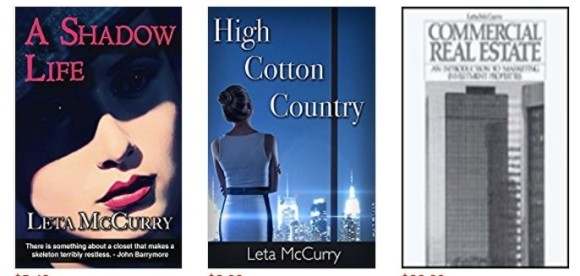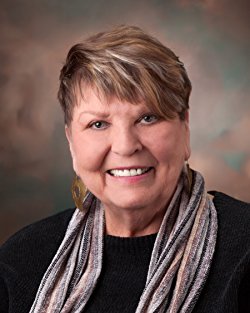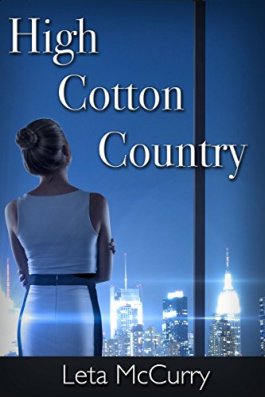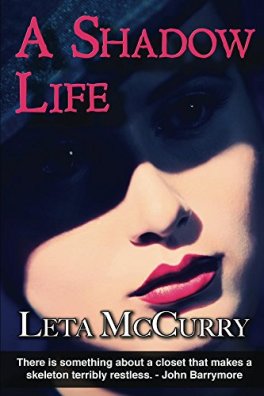
Occasionally I run into somebody who is an absolute inspiration, and recently that happened again.
I don’t want to say too much and end up spoiling it, but I hope you find this post as inspiring as I did. ALL of it, not just the opening line – which is amazing by itself.
I asked this guest some questions and prompted her to do a guest blog post, which she graciously agreed to do.
Prepare to be amazed, and whatever you are working on in your life, know this: it’s never too late.
Here’s Leta McCurry.
.
I am 83. I published my first book, High Cotton Country, at the age of 81…
followed by my second book, A Shadow Life, in the fall of 2016. My work in progress, Dancing to the Silence, is about half done, in competition from time to time by ideas and plots for three or four more books bouncing around in my head.

What made you decide suddenly at that age to write a book?
It wasn’t a sudden decision. I think I was born a writer. This probably stems from the fact I’ve always been a voracious reader. My Mom said I could read the Dick and Jane books by the time I was three.
I didn’t complete a book through to publication until my 80s simply because life got in the way.
I grew up hard, fast, and dirt poor, a child of the depression. By the time I was sixteen, I was a married, barefoot and pregnant high school dropout. My husband was a good ole boy who thought work was a disease to be avoided at all costs. I had three kids by the time I was twenty and five by the time I was twenty-five. My life was an endless, relentless, raw and desperate struggle to survive every day. The most desperate feeling in the whole world is to have hungry kids and no food to give them and no way to get any.
I ended up in a black pit so dark there was no light at the end of the tunnel; there was no tunnel.
There was no way out that I could see, and I couldn’t bear to see my children in this situation with no options or solutions. There were no social services or welfare readily available at that time. I began to plot how I could kill myself and all my kids. One was to maybe drive the car really fast into an overpass, but there was seldom enough gas in the car to get to the corner. A bigger deterrent was the fear that I would only injure myself and them, or that I would kill myself and leave them alone and injured. Alone, in the respect of no one to provide for them even though they had a father. There was just no way I could think of to guarantee we all went together at the same time. The real bottom line was that I just couldn’t do it.
When I would try to talk to my husband, say he was the husband, the father, the man of the house, it was his responsibility to support the family, his answer was always “It’s as much your responsibility as it is mine.” I had no education, no skills and no experience, but there came a time, later, that I did bluff my way into a job as an escrow officer with a local title company and worked at that for several years. My children, especially the younger ones, remember a different man than the one I knew, and that is as it should be. He is their father; they should love and respect him, but this is one of the great puzzles of my life. After we ultimately divorced, he remarried, went to work and held down a job. To this day, I’m still trying to understand. In my heart, I know I was a good wife and the mother of his children. Why would he do for someone else what he would not do for me?
People do have epiphanies. I had one. I was a living pity party. My situation was the fault of anything and everybody except me.

I blamed my parents, society, school, peers, figures of authority, my husband, the circumstances of my birth and child hood, the weather. You name it, they/it were the reason for my circumstances. But I did want a different life. I just didn’t know what to do. I was an uneducated high school drop out with no experience or skills. Except having kids. I was pretty good at that. I still haunted the local library and read a lot, especially anything I thought could help me. Two books were very influential, Maxwell Maltz’s Psycho-Cybernetics and Success Cybernetics by U.S. Anderson.
All the reading, thinking and yearning for a better life must have jelled because one day I had this singular thought. It came to me full-blown and concise, and it came suddenly, loud and crystal clear. I was stunned, actually reeling mentally and emotionally.
It was like God smacked me flat then said, now that I have your attention, hear this: If your life isn’t all you want it to be, it is what you’re willing to settle for, or you would change it.
That may be a quote I read some place or maybe all the reading and thinking became compressed into that single, clear thought. Wherever it came from, it made me so mad, I could have spit enough nails to build a good-sized barn. All of a sudden, in an instant, it was all on me. There was no place to hide. I didn’t want it to be on me. That meant I only had two options; one, admit I was willing to settle for my life the way it was and shut up and quit whining, or two, change it.
I had no clue how I was going to do it, or even where to start, but when I got over being mad, I decided I would do whatever it took to change my life.
It took some time but from there, I went to being probably the first nationally recognized female commercial real estate agent in a field completely dominated by men.
I’ve never sold a house, not even my own, but I sold apartment buildings, office buildings, industrial parks, storage mini-warehouses, shopping centers, etc. No leasing, just sales. And I didn’t work up to it. I jumped right into one of the most aggressive, sophisticated commercial real estate firms in the country. How that happened is a whole other story.
I was the only woman in the firm nationally.
All the other salesmen were young Turks, recently graduated MBAs, attorneys, accountants. Well educated, full-of-themselves hotshots.
They thought I was a joke.
They ridiculed me, and laughed at me.
A woman in commercial real estate was unheard of. They couldn’t believe the owners actually took me on. Bottom line, I kept my mouth shut, put my head down and worked. When they took long, two-cocktail lunches, I was plugging away. When they left early for happy hour, I was still at my desk. I whipped their butts. Not in a small way, but big time. Not once or twice, but continually. During my tenure with that company, I was consistently the number one producer in closed escrows in that office and consistently in the top five nationally.
My first year I missed being the national #1 agent by one sale. The company featured me in a Wall Street Journal ad
and I consistently won top company awards. My first year I earned a quarter of a million dollars, starting flat-footed. To the best of my knowledge there were no other significantly successful female commercial real estate agents anywhere in the country at that time. .
Due to this, I was approached by Prentice Hall in New York, and offered a contract to write a college textbook about commercial real-estate. I accepted the contract and the book, Introduction to Commercial Real Estate, was published in 1990. I was pretty arrogant about it at the time. I thought I can whip this little sucker out in about three months. Instead, it took me three years. It broke my stride in commercial real estate but I had a contract and by the time I finished the book, I had lost all my contacts and momentum in the industry. PLus,
I hated writing the book. I never intended writing non-fiction. I always wanted to write fiction.
 We all have those bright and shining moments in our lives and one of my most vivid is related to writing the real estate book. Once I submitted my manuscript, Prentice Hall assigned an editor and we communicated back and forth. One day I received a letter from her with the salutation, Dear Professor McCurry. I cannot explain the sense of accomplishment, fulfillment and joy that gave me in that moment. Hot damn! Professor McCurry. Me, an Okie high school dropout. I still have that letter and I never corrected her assumption.
We all have those bright and shining moments in our lives and one of my most vivid is related to writing the real estate book. Once I submitted my manuscript, Prentice Hall assigned an editor and we communicated back and forth. One day I received a letter from her with the salutation, Dear Professor McCurry. I cannot explain the sense of accomplishment, fulfillment and joy that gave me in that moment. Hot damn! Professor McCurry. Me, an Okie high school dropout. I still have that letter and I never corrected her assumption.
In 1998, my husband (not the first one) had a stroke and had to close the business in which we were both involved. He progressed quite rapidly to needing a 24/7 caregiver and that was me. He was my entire focus for about ten years with degenerative heart failure, Parkinson’s, COPD, dementia, and prostate cancer. By the time he passed away, I was an emotional and mental sleep-deprived zombie. It was close to a year before I could even begin to pull myself together.
So, although I’ve always been a writer in my mind and intent, life got in the way.
It wasn’t until several months later, after my husband’s passing, when I had regained some sense of humanity, that I remarried and began to think seriously about writing. Was that a ridiculous idea? Was I too old? Would anybody care about books written by an old lady? Should I just hang it all up and slide quietly into the sunset? Hell, no. I decided to write the stories that had been nagging me for years even if I was the only one who read them.
Over the years, there were short periods when I did make a real effort to pursue writing seriously but something always happened.
During one of these periods, many years ago, a friend who believed in me and encouraged me, took me to a three-day writer’s conference in Monterey, California. While there, I pitched the idea that eventually became my first book, High Cotton Country, to a new, young agent from Portland. She was enthusiastic, took the chapters I had and asked me to finish the story and send it to her. A few months later, I received a letter from her asking where was the manuscript. Shortly after returning from the conference, I ended up in a nasty divorce and had to tell her the manuscript had fallen by the wayside and I couldn’t be sure when it would be finished.
The interesting thing is that when I got serious about High Cotton Country and finished the book, I happened to attend a writer’s conference in Portland and guess who was there? The exact same agent, seasoned and not so young anymore. I hadn’t forgotten her because she was so kind to me, but she didn’t remember me until I pitched the same manuscript to her, almost thirty years later. She remembered the story and again was enthusiastic and wanted the whole manuscript.
That forced me to make a decision. Traditional publishing or indie publishing.
The big and almost only real incentive to traditional publishing for me was writer credibility. The main downside was loss of control and the length of time to actual publication. In the end, I decided, at eighty-plus, I didn’t want to wait a year or two to see my book in print. Also, I didn’t want to be under contract for additional books so that I HAD to write. That would have taken the joy out of it for me. So I opted for indie publishing and have never looked back.
What kind of new things like technology did you have to learn to make it happen?
Obviously, when I started writing, it was all manual typewriter. (For Pete’s sake, we didn’t even have a phone or a TV in our house until I was 14).
When I first saw an electric typewriter I thought I had died and gone to heaven, and the computer – wow.
Dick Tracy and Buck Rogers stuff. But I jumped right in and learned to use one. My first computer had paper that came in a big roll and was pulled through the printer by a cogged wheel.
From the beginning, everything that got done, I had to do learn to do myself, from home repairs to changing a tire because I couldn’t afford to have it done and there was no one else willing, able, or available to do it. So, what was born of necessity became a lifestyle habit. If something needs to be done, I learn to do it. It is the same with computers. I taught myself HTML code back in the day before there were handy web site templates. I’m no expert but I’m pretty proficient on the computer. I recently switched from working on a PC for years and years to a Mac. That was a learning curve.
 Who supported you and who kind of rolled her eyes?
Who supported you and who kind of rolled her eyes?
It’s been a long time since anyone rolled their eyes at me. (Well, my new husband may have rolled his eyes a little when I wasn’t looking.)
How did you decide on the topic after 80 years that was finally worth writing about?
The idea for the first book had been simmering and trying to bring itself to life for about a half a century. The idea for the second book and the others in progress and in my head have been around a long time, too.
What is your own favorite line or lines you have written?
Macy sighed. “I wasn’t able to explain that it wasn’t about just downsizing my living space. It was about pulling my life close around me so I could stand in the center, reach out and touch the boundaries and know who I am.”
What is your favorite review by a reader?
I love them all but a standout is: “For the first time ever, I found myself “talking” to her characters as if I was actually there. That is how real her characters feel.”
Another was a message I received from a reader while she was reading High Cotton Country. She said,
“I was riding in the car with my husband yesterday and I said to him, I wonder what Owen’s doing. Then it hit me. Owen’s not real.”
What is your writing process? From idea to published book, what are the links in your particular chain?
I’m a panster. I sit down at the keyboard and let-er rip. Once I start, it seems my fingers think for themselves. I seldom run into a dry spell or writer’s block. The characters seem to have a life of their own and sometimes they just won’t do what I want them to do. Once I start developing a story idea, it plays out in my head like a movie. I write what I see and hear. (Weird, I know.)
Critique partners who read-as-I-write are vital to the process.
Once the book is finished, it goes to an editor and I find a cover designer. The formatting, copyrighting, and other things I do myself. In addition to ebooks, I have published through Create Space, Draft2Digital, Smashwords, Pronoun, and a couple of other sources.
Marketing and promotion is the hardest of all.
The competition is fierce for the reader’s attention and the market place keeps changing. It’s a constant learning curve.
I am fortunate my books have been well received with five star reviews, except for a couple of four stars, and my fans, while not large in number, are enthusiastic and loyal.
Also, reviews are so vital to a book’s success, but they are very hard to come by. Most readers have good intentions but, no matter how much they liked the book, other things get in the way and then they forget.
What would I change about myself?
I wish I wasn’t such an introvert.
Cocktail parties and small talk is my version of a nightmare.
And I often take myself too seriously. I do have a weird and robust sense of humor when it shows up, but that reminds me of the saying I heard one time about witty comebacks. I always think of one, but it comes back the next day.
What do I want people to say about me?
That I jumped into the fire of self-discovery with courage and enthusiasm.
My favorite quote.
What else? Step into the fire of self-discovery. This fire will not burn you. It will only burn what you are not. – Rumi.
When not writing I enjoy a large, happy family, church, good food, dogs (I just lost a cherished pet of many years), and traveling. My favorite destinations are Ireland and Singapore.
Reading is big for me, too, and I normally read about 3 to 5 books a week.
And I’m a biker.
Well, more accurately, a passenger on a trike (biker sounds more exciting,) My husband and I ride as much as we can and have taken some fantastic road trips. (picture attached).

God has blessed me with good health for my age.
People are amazed I still have my natural hair-color, no grey.
I can’t take the credit. It’s in the genes. There’s a lot of longevity and good health in my family. My paternal grandfather lived to be four months short of 111. For many years, he was the oldest man in Texas. I’m the only person I know who had a living grandparent until I was almost seventy years old, a grandparent and great-grandparent myself. We had six living generations when he passed away.
Gang, if you aren’t inspired by that story, check yourself for a pulse.
Leta’s books can be found HERE, and you should post a comment below to let her know just how amazing she is.
32 replies on “It’s Never Too Late – A Truly Inspiring Guest Blog Post by Leta McCurry”
wow, an amazing lady and life story. I am impressed and yes, also inspired.
LikeLiked by 3 people
No kidding!
LikeLiked by 1 person
Reblogged this on Legends of Windemere.
LikeLiked by 2 people
Thank you!
LikeLiked by 1 person
You’re welcome.
LikeLiked by 1 person
What a story! What an inspirational lady! How crazy I was to think that starting to write seriously at the age of fifty was already late.
Juliet
LikeLiked by 2 people
I know, right? Absolutely inspiring.
LikeLiked by 1 person
Great story!
LikeLiked by 2 people
It really is.
LikeLiked by 1 person
Reblogged this on Don Massenzio's Blog.
LikeLiked by 1 person
Wow!
She is incredible
LikeLiked by 2 people
I know. We think we have challenges. Pfft.
LikeLiked by 1 person
Reblogged this on Smorgasbord – Variety is the spice of life and commented:
Dan Alatorre’s guest today is an astonishing and inspiring lady who has taken life’s efforts to pull her down in her stride. She wrote her first book in her 80s and is now on number 3.. Do head over and read.. and stop saying you are too old…. just dive in.. #recommended
LikeLiked by 3 people
The excuses aren’t gonna cut it now! Thanks for the reblog.
LikeLiked by 2 people
Very true… excellent post.
LikeLiked by 2 people
Leta you are a wonderful creation of courage and resilience. Fabulous. xX ❤
LikeLiked by 2 people
It really is.
LikeLiked by 2 people
Dang!
LikeLiked by 2 people
Yep.
LikeLiked by 2 people
My goodness this makes me feel really hopeful! Lol… Plenty time left…. no hurry. I’m just a spring chicken. what a fantastic lady, so inspiring. Terrific. 🙂
LikeLiked by 2 people
I know!
LikeLiked by 1 person
Amazing. I published my first book at 60 – and am working on my 2nd novel. I also worried – who would want to read my book. But if the work is solid – the audience does find you. Thank you for this wonderful piece. It makes us all realize that our dreams only become reality when we take action. No matter how old we are.
LikeLiked by 2 people
Great comments!!
LikeLiked by 1 person
[…] Source: It’s Never Too Late – A Truly Inspiring Guest Blog Post by Leta McCurry […]
LikeLike
Reblogged this on Abbie's Corner of the World and commented:
This post is proof that it’s never too late to do anything you want to do.
LikeLiked by 1 person
It sure is. Thanks for the reblog!
LikeLike
At 77, I am encouraged that I can reach my goals in writing after all. Thanks Abbie Johnson for reblogging this post. Love it.
LikeLiked by 1 person
Go for it! I’m glad you found this post inspiring.
LikeLike
Thank you for sharing this — what a treasure! I’m 61 and from this moment forward I will not tell myself, “Maybe you’re too old.”
LikeLiked by 1 person
You are certainly welcome. Glad you liked it.
LikeLike
AMAZING YOUNG LADY! IF YOU ARE DOWN AND OUT, READ THIS, YOU WILL BE COMPELLED TO GET UP AND MAKE THE LIFE YOU DESERVE! THANKS, DAN.
LikeLiked by 1 person
You might think about switching to decaf
LikeLike